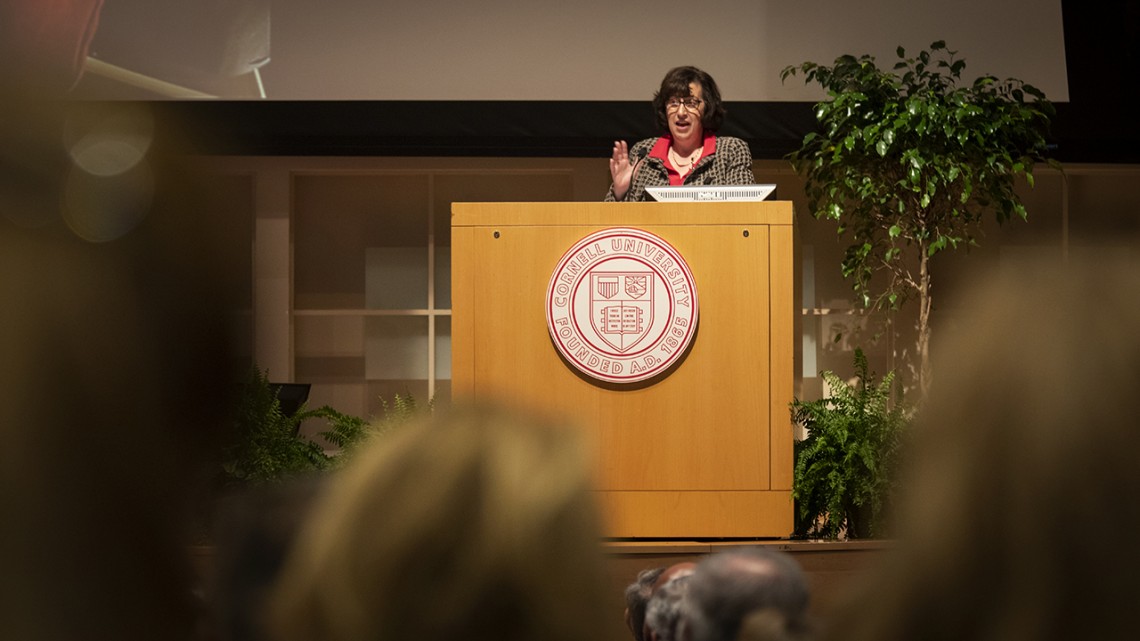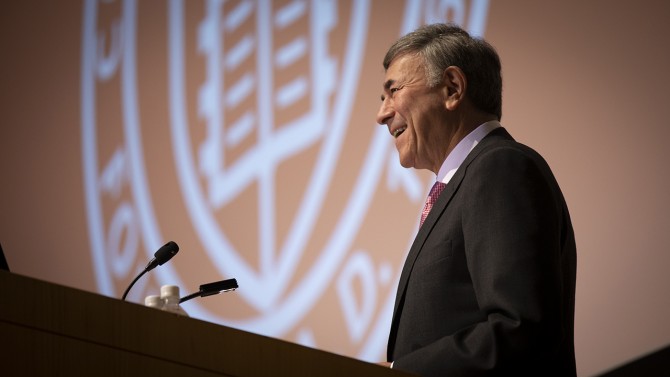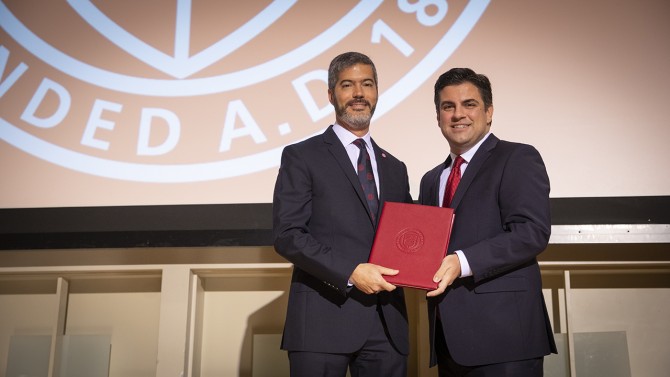
President Martha E. Pollack delivers the State of the University address Nov. 2 in Statler Auditorium.
Cornell is unique, strong and impactful, Pollack says
By Joe Wilensky
President Martha E. Pollack delivered a robust assessment of Cornell during her State of the University Address Nov. 2. She described the university as strong, attracting the very best students, faculty and staff who are having an impact on the world, while drawing high levels of alumni engagement and support.
The address, delivered in Statler Auditorium to approximately 675 trustees, Cornell University Council members, alumni, faculty, staff, students and guests, was part of Trustee-Council Annual Meeting events held in Ithaca Nov. 1-3.
Pollack framed her remarks by quoting Cornell historian Morris Bishop, Class of 1913, M.A. 1914, who, in a 1939 essay, described a speech given by a Midwest college president who criticized a newspaper writer who had listed “as places of intellectual pretensions and as essentially American colleges, Harvard, Yale, Princeton, and perhaps Cornell.”
“It has always been the fate of our university to be ‘perhaps Cornell,’” Pollack quoted Bishop. “A part neither of the aristocratic tradition of the original colonies nor the educational democracy of the great West, half state college, half endowed institution, stoutly liberal and strangely conservative, its activity ranges from research in the noblest mysteries to broadcasting messages on disinfecting brooder houses.”
Pollack described the many and varied ways Cornell is unique but is not “perhaps” anything.
She noted that Cornell continues to attract greater numbers of prospective students, and the yield – the percentage of admitted students who ultimately select Cornell – has also been steadily rising.
“Students aren’t saying, ‘Perhaps I’ll go to Cornell,'” Pollack said. “They’re applying in droves, and when we admit them, they’re saying, ‘Cornell, yes, I’m going!’”
Pollack offered a glimpse of the diversity of the incoming Class of 2022: They are from 47 states and 43 countries; 14 percent are first-generation college students; 27 percent identify as underrepresented minorities; and 48 percent identify as students of color.
She also spotlighted a few of the 173 new faculty members who have joined the Ithaca, Weill Cornell Medicine and Cornell Tech campuses in the past year, noting their clinical excellence and reputations, mentoring efforts and teaching, research funding track records, peer leadership, and collaborations with companies and agencies.
Sponsored research at Cornell has gone up 10 percent in the past year, to about $700 million, she said, and the university also is diversifying its funding sources.
Pollack stressed the importance of the humanities as a critical area of scholarship: “Understanding and appreciating what makes us human is just as important today as it ever was.”
Alumni are critical to Cornell’s mission, Pollack said, noting how many thousands she has met all over the world. “Everywhere I went,” she said, “… I met people like you who are deeply proud of their Cornell education and all the ways it has enriched their lives.”
Alumni are also supporting the university financially. Cornell received $512 million in new gifts in the past year, and the Annual Funds were boosted by $44 million, a 6.5 percent increase over the previous fiscal year. Alumni contributions also helped create the new Martin Y. Tang Welcome Center and include a lead gift for a new building that will house the Atkinson Center for a Sustainable Future and multidisciplinary centers to further connect researchers in Ithaca and New York City.
Circling back to Bishop’s essay, Pollack asked: What makes Cornell so special? She noted its strengths in core liberal arts and the excellence of its professional schools. She described the university’s continued “radical collaboration” efforts that span disciplinary boundaries to solve today’s problems and make discoveries for the future, offering the new Friedman Center for Nutrition and Inflammation as an example.
“Our unique combination of ‘Ivy League plus land grant’ also influences our teaching,” she said. Programs like Engaged Cornell and the Active Learning Initiative are two expressions of how Cornell’s teaching today remains relevant, engaged outside the classroom and attractive to students.
Cornell’s commitment to diversity and inclusion ties directly to its founding principle, she said, and gave an update on steps the university is taking following last year’s Presidential Task Force on Campus Climate recommendations “to ensure that our campus is not just diverse but also inclusive and welcoming.”
Pollack noted challenges Cornell continues to face. To meet growing mental health needs among college students, the university has added counselors and drop-in therapy sites and will conduct a comprehensive evaluation in the coming months.
The university is also continuing to invest heavily in financial aid to keep Cornell affordable for families, and to hold the line on administrative costs while protecting the quality of education.
A current and crucial challenge is the public’s perception of higher education in the United States, she said, citing a recent Gallup survey noting that only 48 percent of American adults are confident in higher education’s role, down from 57 percent three years ago.
“One of the most important things you can do for Cornell is to get the word out about the value your education has had – as an investment in your career and in the quality of your life,” she said.
Pollack said despite the challenges, which all universities face, she has “no hesitancy in saying that the state of Cornell University is strong.”
As Bishop, in his essay, pondered whether Cornellians should complain that the university defies classification in the educational world, Pollack quoted him as ultimately attributing Cornell’s qualities and growth to the characteristics of the seed itself, planted by founder Ezra Cornell:
“As the qualities in the seed persist and fructify, it may be that foreign observers hunting the essentially American college will specify Cornell University. And perhaps Harvard, Yale and Princeton.”
Media Contact
Get Cornell news delivered right to your inbox.
Subscribe


